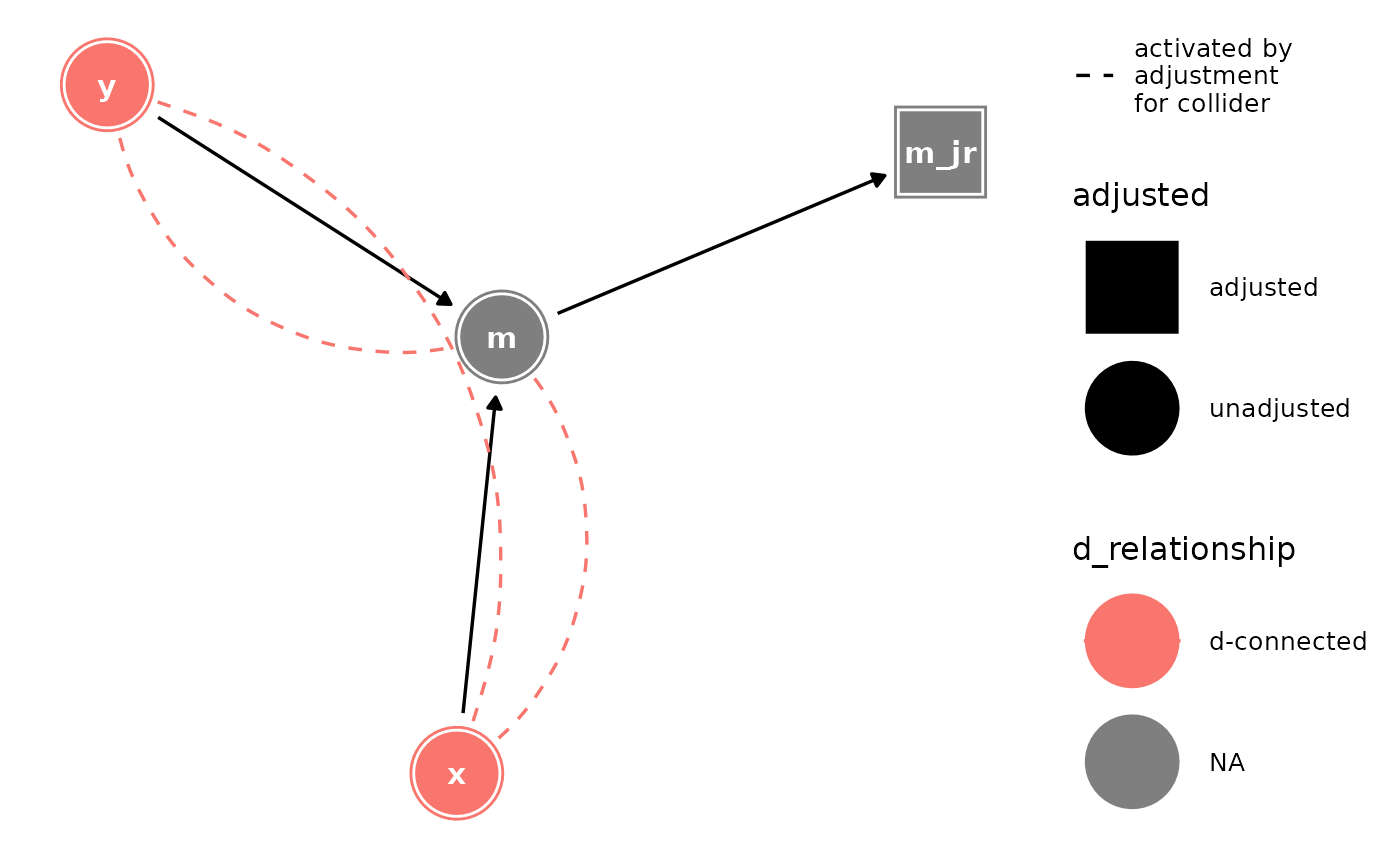D-separation is a key concept in causal structural models. Variables are
d-separated if there are no open paths between them. The node_d*()
functions label variables as d-connected or d-separated. The
ggdag_d*() functions plot the results. The *_dconnected(),
*_dseparated(), and *_drelationship() functions essentially
produce the same output and are just different ways of thinking about the
relationship. See dagitty::dseparated() for details.
Usage
node_dconnected(
.tdy_dag,
from = NULL,
to = NULL,
controlling_for = NULL,
as_factor = TRUE,
...
)
node_dseparated(
.tdy_dag,
from = NULL,
to = NULL,
controlling_for = NULL,
as_factor = TRUE
)
node_drelationship(
.tdy_dag,
from = NULL,
to = NULL,
controlling_for = NULL,
as_factor = TRUE
)
ggdag_drelationship(
.tdy_dag,
from = NULL,
to = NULL,
controlling_for = NULL,
...,
edge_type = "link_arc",
size = 1,
node_size = 16,
text_size = 3.88,
label_size = text_size,
text_col = "white",
label_col = "black",
edge_width = 0.6,
edge_cap = 10,
arrow_length = 5,
use_edges = TRUE,
use_nodes = TRUE,
use_stylized = FALSE,
use_text = TRUE,
use_labels = FALSE,
label_geom = geom_dag_label_repel,
unified_legend = TRUE,
key_glyph = draw_key_dag_point,
label = NULL,
text = NULL,
node = deprecated(),
stylized = deprecated(),
collider_lines = TRUE
)
ggdag_dseparated(
.tdy_dag,
from = NULL,
to = NULL,
controlling_for = NULL,
...,
edge_type = "link_arc",
size = 1,
node_size = 16,
text_size = 3.88,
label_size = text_size,
text_col = "white",
label_col = "black",
edge_width = 0.6,
edge_cap = 10,
arrow_length = 5,
use_edges = TRUE,
use_nodes = TRUE,
use_stylized = FALSE,
use_text = TRUE,
use_labels = FALSE,
label_geom = geom_dag_label_repel,
unified_legend = TRUE,
key_glyph = draw_key_dag_point,
label = NULL,
text = NULL,
node = deprecated(),
stylized = deprecated(),
collider_lines = TRUE
)
ggdag_dconnected(
.tdy_dag,
from = NULL,
to = NULL,
controlling_for = NULL,
...,
edge_type = "link_arc",
size = 1,
node_size = 16,
text_size = 3.88,
label_size = text_size,
text_col = "white",
label_col = "black",
edge_width = 0.6,
edge_cap = 10,
arrow_length = 5,
use_edges = TRUE,
use_nodes = TRUE,
use_stylized = FALSE,
use_text = TRUE,
use_labels = FALSE,
label_geom = geom_dag_label_repel,
unified_legend = TRUE,
key_glyph = draw_key_dag_point,
label = NULL,
text = NULL,
node = deprecated(),
stylized = deprecated(),
collider_lines = TRUE
)Arguments
- .tdy_dag
A
tidy_dagittyordagittyobject- from
A character vector with starting node name(s), or
NULL. IfNULL, checks DAG for exposure variable.- to
A character vector with ending node name(s), or
NULL. IfNULL, checks DAG for outcome variable.- controlling_for
A set of variables to control for. This can be a character vector of variable names, a list of the form
list(c(...)), orNULL. WhenNULL, no control is applied. Default isNULL.- as_factor
Logical. Should the column be a factor?
- ...
additional arguments passed to
tidy_dagitty()- edge_type
The type of edge, one of "link_arc", "link", "arc", "diagonal".
- size
A numeric value scaling the size of all elements in the DAG. This allows you to change the scale of the DAG without changing the proportions.
- node_size
The size of the nodes.
- text_size
The size of the text.
- label_size
The size of the labels.
- text_col
The color of the text.
- label_col
The color of the labels.
- edge_width
The width of the edges.
- edge_cap
The size of edge caps (the distance between the arrowheads and the node borders).
- arrow_length
The length of arrows on edges.
- use_edges
A logical value. Include a
geom_dag_edges*()function? IfTRUE, which is determined byedge_type.- use_nodes
A logical value. Include
geom_dag_point()?- use_stylized
A logical value. Include
geom_dag_node()?- use_text
A logical value. Include
geom_dag_text()?- use_labels
A logical value. Include a label geom? The specific geom used is controlled by
label_geom.- label_geom
A geom function to use for drawing labels when
use_labels = TRUE. Default isgeom_dag_label_repel. Other options includegeom_dag_label,geom_dag_text_repel,geom_dag_label_repel2, andgeom_dag_text_repel2.- unified_legend
A logical value. When
TRUEand bothuse_edgesanduse_nodesareTRUE, creates a unified legend entry showing both nodes and edges in a single key, and hides the separate edge legend. This creates cleaner, more compact legends. Default isTRUE.- key_glyph
A function to use for drawing the legend key glyph for nodes. If
NULL(the default), the glyph is chosen automatically based on theunified_legendsetting. When provided, this overrides the automatic selection. Common options includedraw_key_dag_point,draw_key_dag_combined, anddraw_key_dag_collider.- label
The bare name of a column to use for labels. If
use_labels = TRUE, the default is to uselabel.- text
The bare name of a column to use for
geom_dag_text(). Ifuse_text = TRUE, the default is to usename.- node
Deprecated.
- stylized
Deprecated.
- collider_lines
Logical. Should paths opened by conditioning on colliders be shown?
Examples
library(ggplot2)
dag <- dagify(m ~ x + y)
dag |> ggdag_drelationship("x", "y")
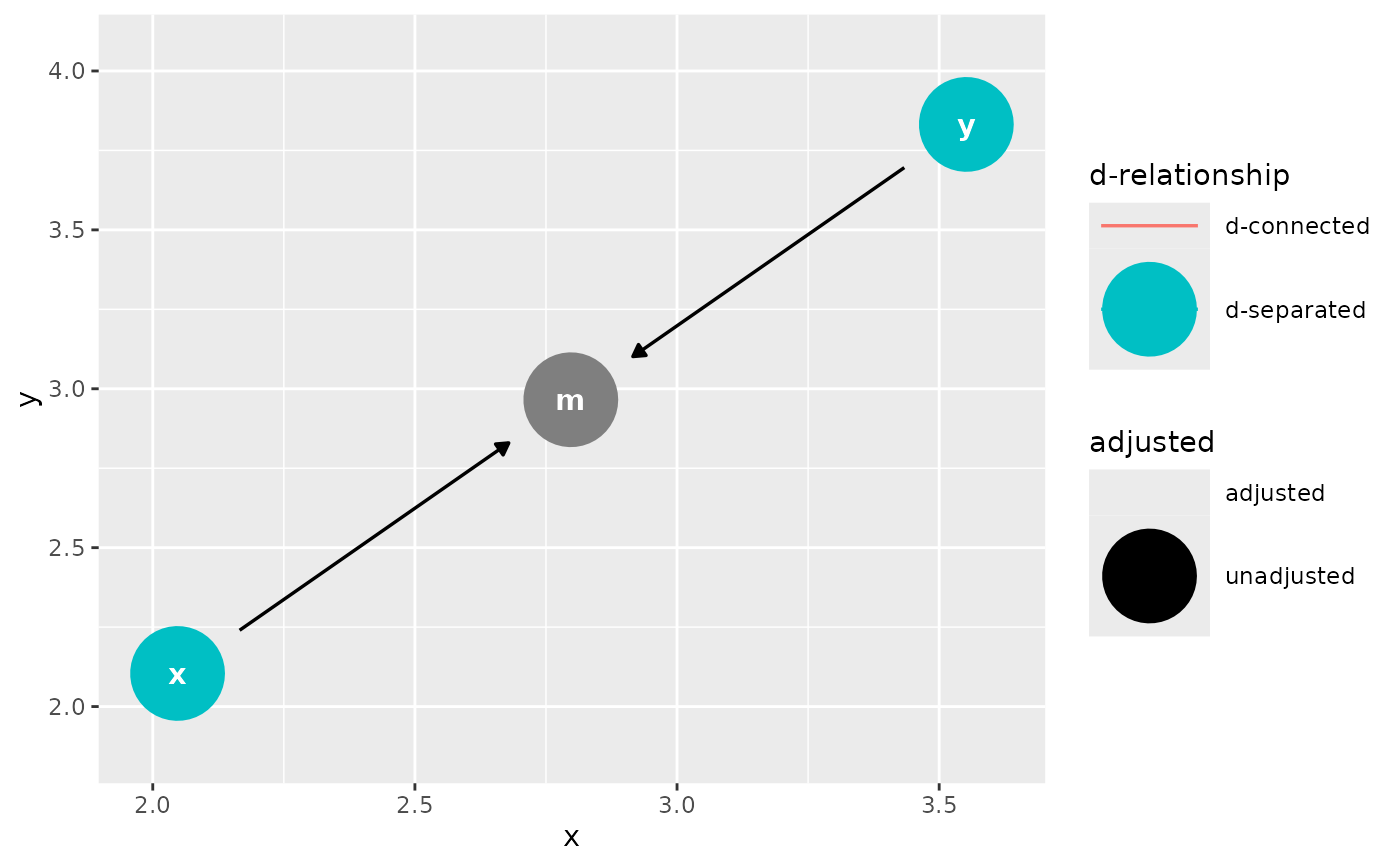 dag |> ggdag_drelationship("x", "y", controlling_for = "m")
dag |> ggdag_drelationship("x", "y", controlling_for = "m")
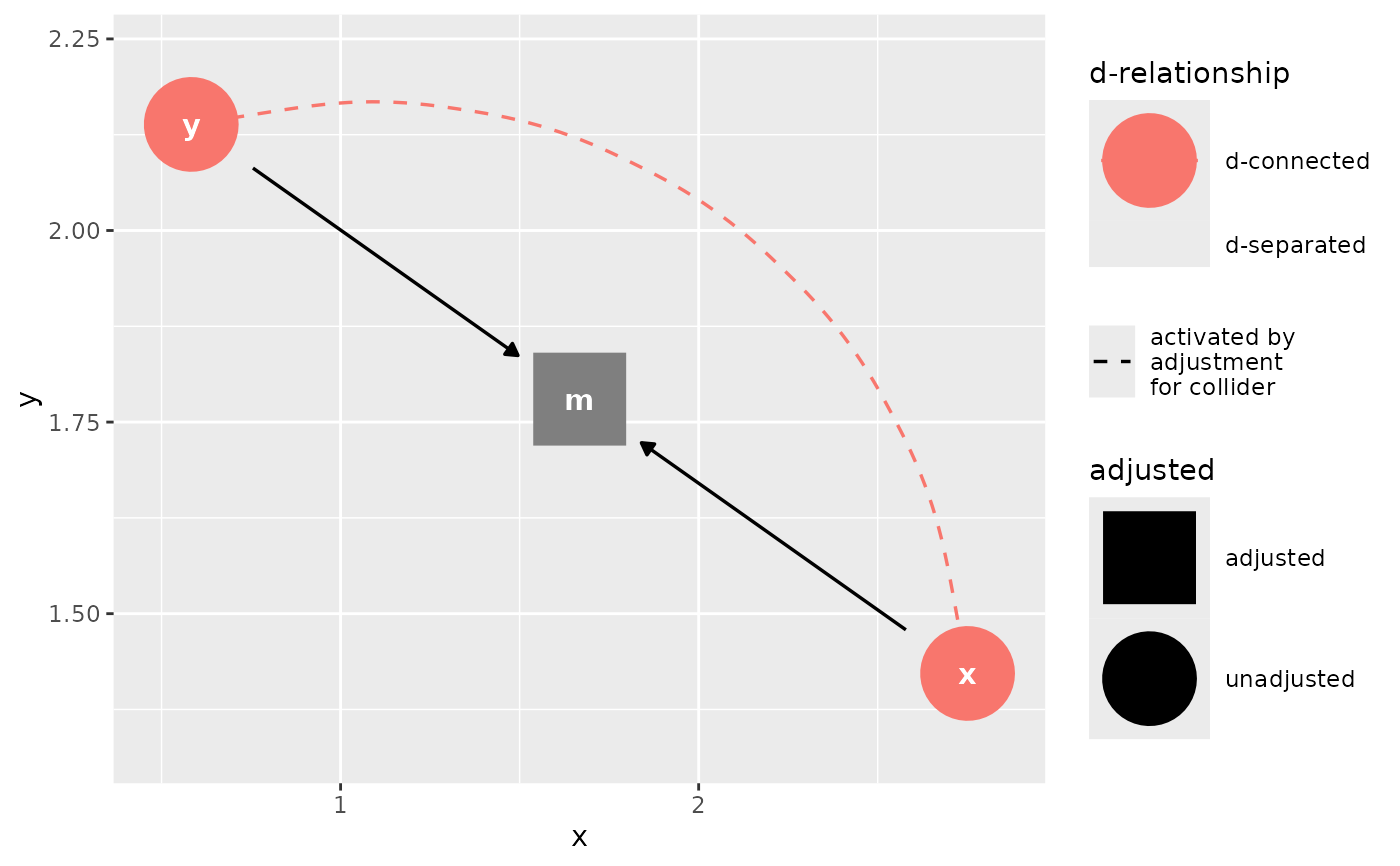 dag |>
node_dseparated("x", "y") |>
ggplot(aes(x = x, y = y, xend = xend, yend = yend, shape = adjusted,
col = d_relationship)) +
geom_dag_edges() +
geom_dag_collider_edges() +
geom_dag_node() +
geom_dag_text(col = "white") +
theme_dag() +
scale_adjusted(include_color = FALSE)
dag |>
node_dseparated("x", "y") |>
ggplot(aes(x = x, y = y, xend = xend, yend = yend, shape = adjusted,
col = d_relationship)) +
geom_dag_edges() +
geom_dag_collider_edges() +
geom_dag_node() +
geom_dag_text(col = "white") +
theme_dag() +
scale_adjusted(include_color = FALSE)
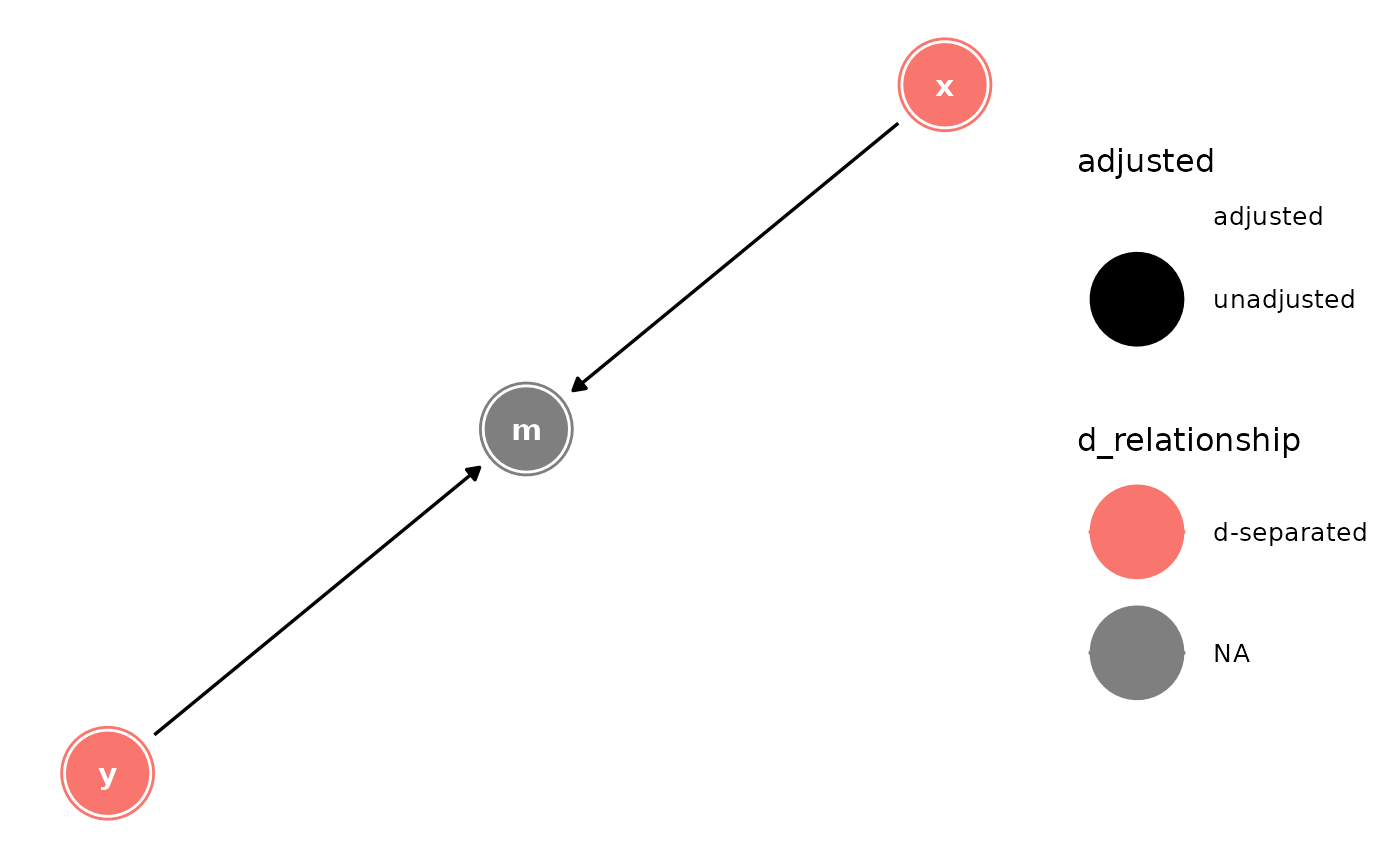 dag |>
node_dconnected("x", "y", controlling_for = "m") |>
ggplot(aes(x = x, y = y, xend = xend, yend = yend, shape = adjusted,
col = d_relationship)) +
geom_dag_edges() +
geom_dag_collider_edges() +
geom_dag_node() +
geom_dag_text(col = "white") +
theme_dag() +
scale_adjusted(include_color = FALSE)
dag |>
node_dconnected("x", "y", controlling_for = "m") |>
ggplot(aes(x = x, y = y, xend = xend, yend = yend, shape = adjusted,
col = d_relationship)) +
geom_dag_edges() +
geom_dag_collider_edges() +
geom_dag_node() +
geom_dag_text(col = "white") +
theme_dag() +
scale_adjusted(include_color = FALSE)
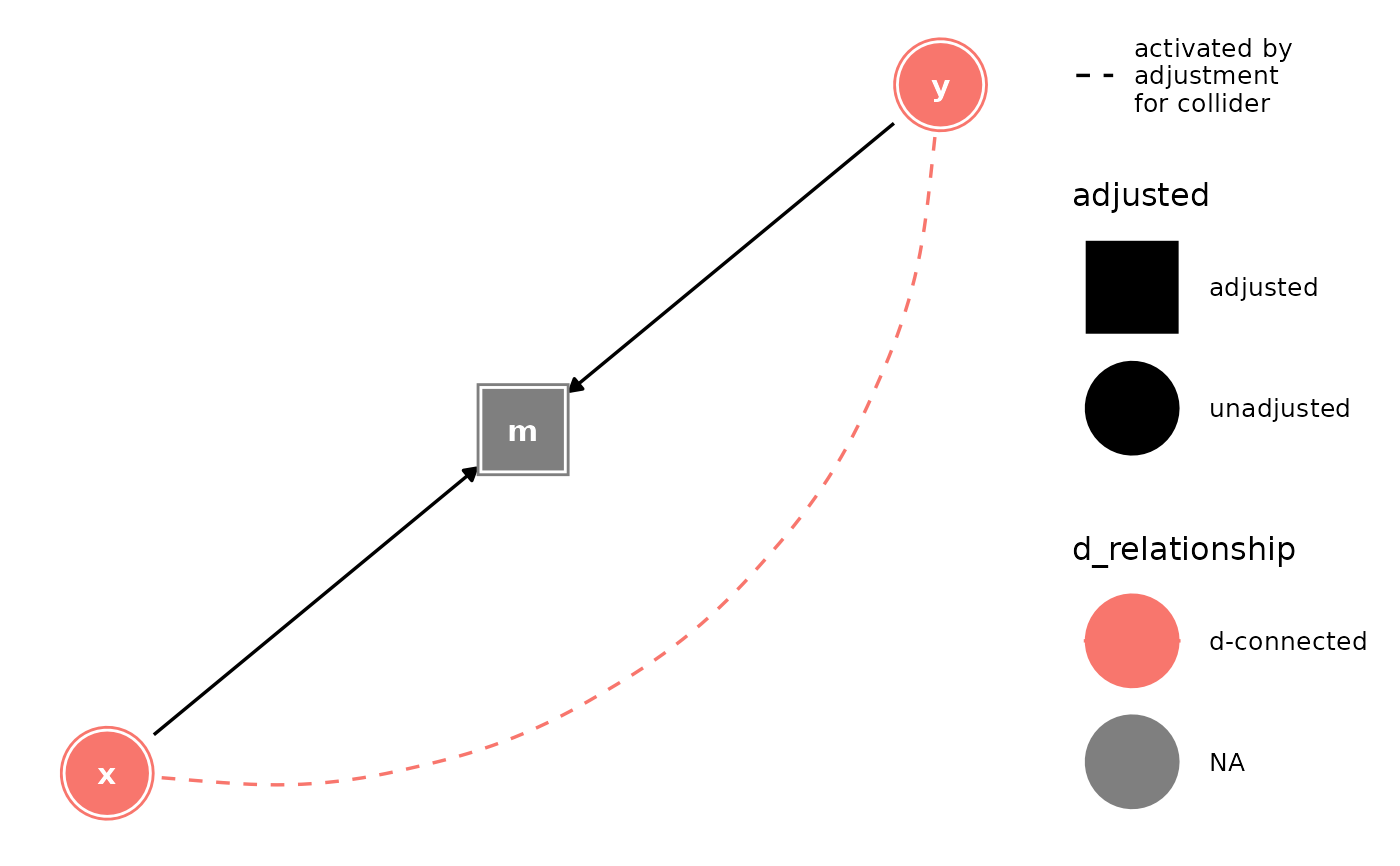 dagify(m ~ x + y, m_jr ~ m) |>
tidy_dagitty(layout = "nicely") |>
node_dconnected("x", "y", controlling_for = "m_jr") |>
ggplot(aes(x = x, y = y, xend = xend, yend = yend, shape = adjusted,
col = d_relationship)) +
geom_dag_edges() +
geom_dag_collider_edges() +
geom_dag_node() +
geom_dag_text(col = "white") +
theme_dag() +
scale_adjusted(include_color = FALSE)
dagify(m ~ x + y, m_jr ~ m) |>
tidy_dagitty(layout = "nicely") |>
node_dconnected("x", "y", controlling_for = "m_jr") |>
ggplot(aes(x = x, y = y, xend = xend, yend = yend, shape = adjusted,
col = d_relationship)) +
geom_dag_edges() +
geom_dag_collider_edges() +
geom_dag_node() +
geom_dag_text(col = "white") +
theme_dag() +
scale_adjusted(include_color = FALSE)
